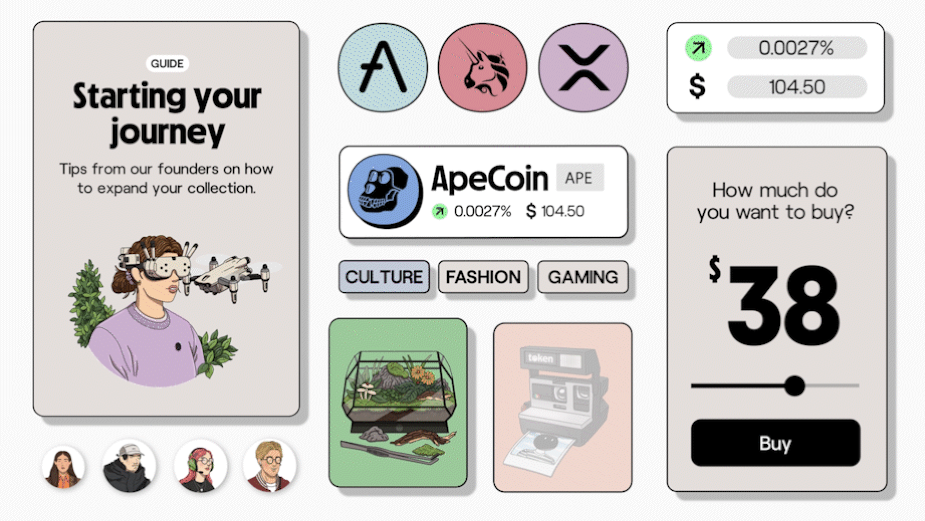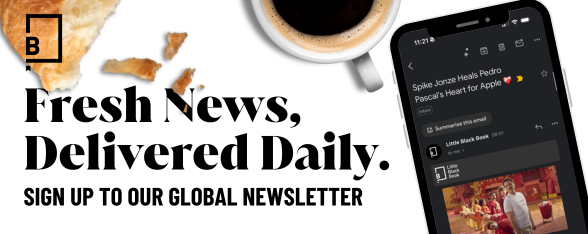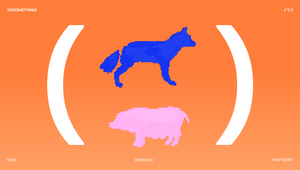
A Web3 Rebrand in the Depths of a Bear Market

Wherever you might think we are in the hype cycle, it’s hard to argue that we’re transitioning between an age of web2 and web3 right now. And while the crypto space has taken some major hits of late, it seems naive to write it off as a failed technology.
That’s certainly the narrative that crypto exchange token.com would suggest you believe in, as illustrated by the brand strategy and visual identity it unveiled for its global launch this week. Creative company 20something, in partnership with ON collaborated with the brand to visualise the next-generation internet in a more human, approachable way than most would see it.
LBB’s Alex Reeves spoke to Ben Kendall, VP marketing for the brand, whose CV includes marketing roles at Red Bull and Vita Coco, before seven years at Airbnb working at a global level. Also joining the conversation is Frances Docx, 20something’s strategy partner, who was instrumental in positioning, digging into audiences, and establishing many of the creative principles behind token.com.
LBB> How would you explain token.com to somebody who'd never heard of web3?
Ben> It's an easy platform to discover future technologies, future projects, and discover the world of web3. That's how we're approaching things now. It's a platform to discover all the weird and wonderful things that exist within web3.
Frances> And learn about it, I suppose. If you don't know about web3, it's a huge compendium or catalogue of all the amazing projects and innovations that are happening that you can then learn about, invest in, and be a part of. So an authority in that space.
LBB> What’s token.com’s plan to bring web3 to the mainstream?
Ben> This is why I joined token.com in the first place. I worked for Airbnb for seven years, and I've always been in the big brands. I was living in Lisbon and surrounded by a lot of people that worked in web3 who were trying to build projects for mass adoption, but fundamentally didn't understand how to communicate to a web2 audience. The problem with web3 today has been they've put the technology at the front and centre, and actually, a large portion of people don't want to know about the technology. They just want it to work.
A lot of that is what we are doing from a front-end design and a brand comms perspective – to onboard normal people into the space so they understand it more. To date, there really haven't been that many projects and companies in space that have done that. So, for us, it was very much how we redesign the product for ordinary people to understand what's going on. And from a brand communication perspective, how we become accessible, how we're not alienating people and making them feel afraid of this space, but actually educating them on what the technology is and projects that exist there. Here is a very friendly, approachable brand to onboard you into the space.
Frances> I think one of the really amazing things the team hit upon is the idea of discoverability. In the past, if you wanted to be in the web3 or crypto space, you had to go really deep on Reddit, or you had to be doing your homework all the time. Nobody has time to do that, and that's a massive barrier for anybody wanting to learn about the space or invest in the space. So, this is a shortcut into it. You can have these very short, very concise, very simple, very snackable explanations of what a token is, what a project is, what a new idea is, and it's all written in terms of the benefit to people. As Ben says, it's not about all the technology necessarily, it's all about what the value is to you.
LBB> How has 20something been helping to guide that path with token.com?
Frances> When Token came to us, they had this beautiful, brilliant vision of what the future of the product would be. I think it was still in beta stages. What we needed to do was, firstly, get really, really clear on the audience and the level of understanding that we were going to go after and what their needs were. So, we did a really, really big global research piece.
We were trying to understand who to target because there's a lot of brands out there that are positioning themselves either for the super newbies, or for the crypto experts. We had a feeling from the very beginning that if we were to position ourselves as literally for the super newbie, we’d be contesting a relatively crowded part of the market. . But, it's also something that I thought, because of the scope of what Token can offer, we would grow out of quite quickly. We had the capability to take people on this much longer, more emotionally invested journey into learning about projects and learning about how this technology is changing the world, rather than those who just want to know how to buy some crypto.
So, we initially made quite a big decision to target people who had a rudimentary understanding or interest in this space, but were ready for that next level of involvement to start participating and generating value in the space.
Working out who the audience was and then spending a long time talking to them and learning what their needs were, what their fears were, and what the barriers were was the next step. Unsurprisingly, the big thing that came up was trust. It's a space where there've been a lot of rug-pulls and disappointments. Famously, it's been a bit up and down in the press. So, we had to find a way to talk to them that would make them trust in the space, but do so without going too corporate or finance-y. I think when people say 'trust', they often think they need to look like HSBC or Barclays or have that very traditional positioning. But they not only wanted trust, they also wanted excitement and fun because that is what this space is all about as well. It's possibility! That's the key pillar of the strategy that went into the design work: how do we make something that feels approachable, trustworthy, rich and sophisticated, but not boring, and not another one of these trader-y kinds of spaces.
LBB> What have you learned from web2 brand marketing that you’re applying to this rebrand for a web3 brand?
Ben> The design aspect of the brand is really important. What web2 brands have done very well is design things that are simple and easy to understand. And we've innately become used to using that type of front-end tech, whether it's how you scroll through Instagram, or through how you search on Google. The UI aspect of things is really easy. If you look at the vast majority of web3-based businesses, they’re hyper-complicated. A lot of them have existed within Reddit and Discord forums. They’re built by engineers, for engineers, initially.
Now, we're coming to the point where we're starting to onboard a mass mainstream audience and those people who are adept at using more of a web2 interface. So that's the biggest piece: how do we bring the kind of innate front-end design and UI experience we all are well accustomed to in web2, and start applying that to web3? There's only a finite amount of businesses that have done it well. Coinbase is one of them, OpenSea from an NFT perspective, as well as a few others that brought the lessons learned from web2, from a UI perspective, and applied it to their businesses within web3.
From a comms perspective, it is starting to lean into general values that people appreciate in life to some extent. People don't really talk about values, about belonging, or about any of these kinds of things within web3. It's, again, very much communicating with tech. How's the tech expediting human society in some way? But it's really complicated, again, because it's being communicated by engineers for engineers, a lot of the time. So how do we get down to the core value propositions that a web2 audience feels more comfortable discussing and dealing with? That's where Fran was coming in around the values piece there, and leaning into the interest and discovery. Those comms points are key to getting people to understand. That's something that we feel is missing in the space today.
Frances> One of the key things that we kept talking about that came from Mel, the founder, was that this is Tinder for tokens; this idea that you can flip through something and people immediately understand that behaviour and how they're supposed to engage with it. So, I think those web2 shortcuts are really important for web3 brands.
Ben and I recently went to ETHPrague, and I was talking to a lot of the kinds of companies out there who I would actually call more technologies than brands, because I don't think many of them are at the stage where they are translating what they're doing and working on into something that is really understandable by anybody beyond their inner circle. However, that commercialisation skill set and marketing skill set is just so fundamental. It is also a pattern that we saw in a lot of the previous round of innovation, where you get the Teslas of this world who say, ’We don't need to advertise’. And then, after a period of time, they really do, because you only operate in that small space before you can kind of step out and get that growth. Core marketing skills are just super important, I'd say.
LBB> If we speak again in six months, what do you hope people will know about token.com?
Ben> Rebranding in a bear market is an interesting one because, within that time, you've got a lot of negativity, and a lot of critics. But what it does is pull out all the scammers and the best projects - the most honest and tangible cases are the ones that prevail. So, what we hope in six months is that the bear market is somewhat behind us, that we're starting to see the impact of a bull market, and that there is more focus on the genuine, tangible impact of the technology. I think that's what happens when you go through these new web developments. The scammers emerge, they make their money, they fail, and they move on. after which the real, honest and tangible technologies stick out. We really see ourselves as being one of those.
But also, we’re hoping to be a platform for you to discover those more tangible and real projects that are hopefully making a more positive impact on the world. It's really just about seeing that there is a community that lives and breathes in token.com, that is buying and selling multiple tokens. Rather than just coming in and buying a Bitcoin and then leaving and coming back in a year's time to see how it's performing, the app is very much geared to discover and just find out more about the space. If you like Bitcoin, then we'll serve you up a token which we feel is relevant to it in some capacity. And then, through our snackable token cards, you should be able to digest quite a bit of information and grasp what that's doing, and what the tangible output of that project is, allowing you to go "Cool, I'm gonna throw a bit of money into that and see what happens!"
Investing is quite a hard word to coin, and in crypto because of regulation and because of the fluctuations in prices, it's quite hard to say 'invest', but we really do feel like the app is geared towards investing because you should be looking at these things on a long term basis. You're right at the start of this technology. You're discovering something, investing in it for the long term, and seeing what happens. And you’re showing your support! Invest and support are quite closely linked, and that's what we really want the app to be – showing your support for these projects.
In six months, I hope people hold multiple tokens, they've discovered multiple projects, and they're showing their support for those for the long term. Outside of that, from a consumer perspective, hopefully we're seen as the beginning of a new age in investing in crypto and the safer option to do so, versus the more hyper-tech web3-based platforms that you've experienced to date, which are really built for traders. We're trying to come along to make it easily accessible and easy to understand, so you can actually work out what's going on here and learn.
LBB> What are the broader marketing lessons to be learned from this rebrand?
Frances> What the token economy represents is a real shift in the value exchange between brands and consumers. It is a symptom of a much broader movement that we're going to see in the future - one I think brands really need to be aware of. In the past, there was a linear transaction where a brand would have a product and they would sell it to the consumer. End of story. Web3 brands and consumers are seeing the value that consumers themselves bring, whether it's their data, their followers, their content, or so on. Being able to tokenise those things or turn them into pieces of value on the internet creates a really different dynamic between brands and consumers. It means that more and more consumers can demand bigger and bigger things from brands. It means that brands are able to have a longer term relationship with consumers. Consumers might buy into a membership of that brand, where there's a give and take on both sides. So, what is the consumer doing to boost that brand? What is the brand doing to give status to that consumer? These new ideas are about to emerge, and they’re really worth starting to think about in terms of not just your marketing, but your value proposition in a digital world.















